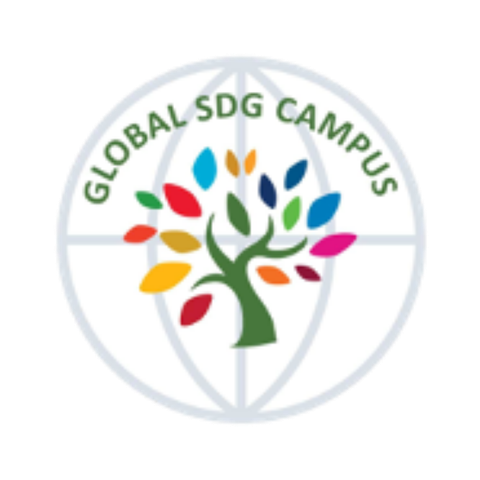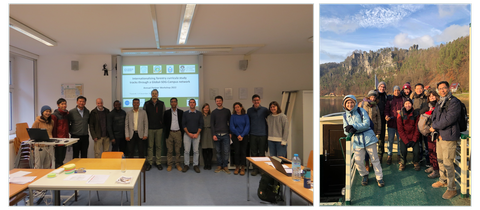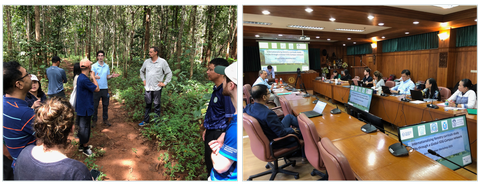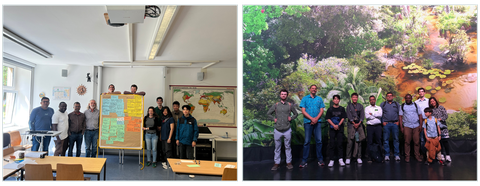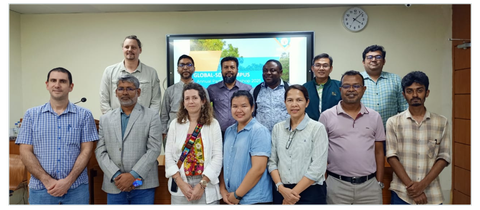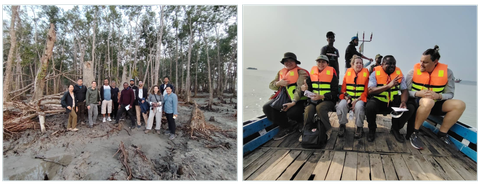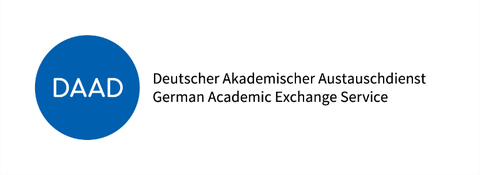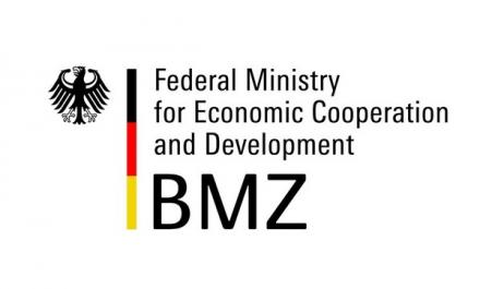Global SDG Campus Network
By addressing global challenges, the Sustainable Development Goals (SDGs) provide the framework for a better and more sustainable future for all. International cooperation between higher education institutions is an essential component in achieving these goals. The Global-SDG-Campus network aims to support higher education and research in forestry at TU Dresden and its partners in the Global South in anchoring sustainability topics more firmly in teaching, research, and transfer.
The Project Partners
The project seeks to develop a dynamic university network within which the forest-related master's programmes of the collaborating partner universities will sharpen their profiles in terms of the SDGs. Additionally, a standard Global Campus Mobility procedure will be established to facilitate the exchange of students and scientists to enhance joint learning and collaborative research among the partner universities.

The project partners of the Global-SDG-Campus Network
The project partners and their specific thematic profiles are:
- Technische Universität Dresden, Germany: Actors and Forest Governance
- University of Bamenda, Cameroon: NTFP-Domestication in Agroforestry Systems
- Kasetsart University, Thailand: Tropical Plantation Forestry
- Khulna University, Bangladesh: Mangrove Forest Management
- Universidad Nacional de La Plata, Argentina: Subtropical Forest Ecosystems
The Background
Forests play a vital role in human well-being worldwide and are key to achieving many of the SDGs, such as Climate Action (SDG 13), Life on Earth (SDG 15), and Clean Water (SDG 6). While forestry-related challenges are increasingly recognized as global issues, forestry education is internationally fragmented due to a lack of routine academic and administrative teaching cooperation across higher education organisations.
By bringing together universities from four continents, the Global-SDG-Campus will strategically expand existing collaborations between the partners into a dynamic university network that will facilitate international postgraduate education and student mobility among the partner universities. Scientists will jointly address forest-related SDG topics in global contexts and integrate them into curricula, learning structures, and the development of a joint module on SDG contributions from forestry and forest landscapes.
Spheres and objectives
The project aims to align existing teaching content more closely with the SDGs using the forest landscape approach. Drawing on knowledge transfer and joint research in fields like locally appropriate tree-based production systems, forest ecosystem management, and valuation of forest governance, many SDGs are addressed directly and indirectly. Thus, many ecosystem services from forests are addressed, resulting in questions regarding water retention and regulation, carbon sequestration, soil improvement, energy supply, diversified food supply, and additional income.
The project consists of three different components that complement each other in an integrated way. Collaborative research and teaching development towards SDG relevance run parallel with joint efforts in improving university management and administrative procedures across the partners. Beyond that, non-university stakeholders are consulted to ensure the relevance and appropriateness of project outcomes regarding current developments and needs on the ground.

The project setup of the Global-SDG-Campus network
The Intended Impact
Achieving the SDGs is an integrated process that requires substantial changes in values, belief systems, and management paradigms – all of which will need change agents on site. After graduation, many of the partner universities' students work in important positions in ministries, civil society organisations, research institutions, supra-national organisations and the private sector. These positions give access to established governance structures and policy processes at different levels, enabling them to stimulate pro-SDG developments.
Project Activities and Outcomes
1. Student mobility across the Global-SDG-Campus
Since 2022, the Global-SDG-Campus has served as a structured initiative aimed at facilitating the mutual recognition of academic achievements between partner universities during international exchanges. This model enables students to personalize their academic journey, gaining expertise in specialized fields at partner universities while also gaining valuable international experience.
In addition to mobilities funded by DAAD, opportunities have also been extended through the ERASMUS+ project. To date, 9 student mobilities from the South partners have been successfully completed, each lasting 3-5 months. These mobilities have included the transfer of academic credits to the students' home universities.
2. Joint online teaching course "SDG-contributions from Forest Landscapes"
Through a collaborative evaluation of the participating study programs and curricula, the partner consortium developed recommendations for integrating forest-related SDG topics into curricula and learning structures. These recommendations are set to be implemented as part of the upcoming curricular reforms. At TU Dresden, they have been incorporated into the ongoing Curriculum Reform 2025, with study visits firmly established as an elective option within the new curriculum for TUD students specializing in Tropical Forestry with a focus on Tropical Forest Management at partner universities.
Building on this, the consortium developed the online learning module 'SDG Contributions from Forest Landscapes', which will be integrated into the curricula of the partner universities. This aims to strengthen forest-related SDG topics and systematically address gaps in teaching. The expertise of the participating partners will thus be made accessible across institutions, contributing to the sustainable enhancement of teaching quality.
3. International Forestry Field School
To strengthen the direct North-South-South exchange of students, an international field school was organized, driven by the shared understanding that teaching should be more practice-oriented, with a strong emphasis on field experience. The 12-day International Field School, held in 2024, was jointly organized by TU Dresden and Kasetsart University (Thailand), focusing on sustainable timber plantation management using teak—an indigenous species of Southeast Asia—as a case study. A total of 18 international students participated in the program.
The field school promoted integrative, problem-oriented learning, exploring the silvicultural, economic, and social aspects of teak production and its use within a bioeconomic framework. The students engaged with forest authorities, plantation owners, forest cooperatives, and sawmills. This holistic approach ensures a comprehensive understanding of both the teak economy and its social and ecological dimensions. The field school was seamlessly integrated into the ongoing curricula of both universities, allowing students to earn credits that were transferred to their home institutions.
International Forestry Field School 2024: Teak Plantation Management in Thailand (Handbook)
4. Annual partner workshops
The foundation for implementation lies in the annual partner meetings, which serve as a platform not only for planning project activities such as student and staff mobilities within the Global-SDG-Campus but also for academic exchanges on joint curriculum development, online teaching initiatives, and field excursions aimed at developing collaborative forestry field schools.
Partner meeting 2022 at TU Dresden in Tharandt/Dresden (Germany):
Global-SDG-Campus Annual Partner Workshop 2022 (Handbook)
Partner meeting 2023 at Kasetsart University in Bangkok/Chiang Mai (Thailand):
Global-SDG-Campus Annual Partner Workshop 2023 (Handbook)
Partner meeting 2024 at TU Dresden in Tharandt/Dresden (Germany):
GLOBAL-SDG-CAMPUS Annual Partner Workshop 2024 (Handbook)
Partner meeting 2025 at Khulna University in Khulna (Bangladesh):
GLOBAL-SDG-CAMPUS Annual Partner Workshop 2025 (Handbook)
Funding
The Global-SDG-Campus network is sponsored by the German Academic Exchange Service (DAAD).
The project is financed with funds from the Federal Ministry for Economic Cooperation and Development (BMZ).
Contact
Project coordination and contact at TUD: Dr. Simon Benedikter
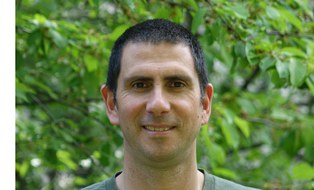 © Institut
© Institut
Dr. Simon Benedikter
Project coordinator
Send encrypted email via the SecureMail portal (for TUD external users only).
Professur für Tropische und Internationale Forstwirtschaft
Besucheradresse:
Cotta Bau, room 2.21 Pienner Straße 7
01737 Tharandt
None

